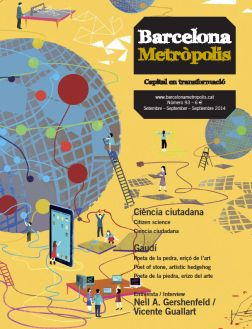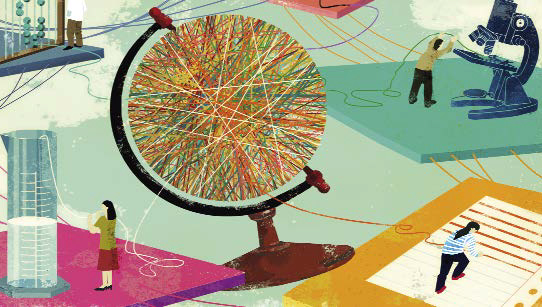PyBossa is an open source tool that allows any citizen to create their own project to analyse a problem, hypothesis or experiment using the scientific method.
Nowadays, citizens are literally inundated by thousands of news items and pieces of data. Every day we wake up to new information on diseases, rates, pollution, deforestation, etc. This information usually reaches us in a clean state, reduced to its bare essence: a few graphics on a newspaper cover. But how was it created? What methods were used? And, what is most important: is it reliable?
All these questions are the basis of the scientific method. The scientific method guarantees that any knowledge we acquire is correct. That we can replicate the results, analyse them with similar methods and reach the same conclusions. Therefore, the scientific method is essential in progressing from simple opinions to proven facts.
However, our society does not use this critical way of thinking when it is bombarded day after day with new data. It would seem that mere fact of being able access information means its conclusions are correct, but this is not so. We need a more critical mind to be able to compare data. For this reason, citizens, people like you and me, need tools that allow us to rigorously test and analyse whether the results published in different media (newspapers, scientific articles, government data, budgets, etc.) are correct or not, since our goal as a society is to make our world a better place.
This is why PyBossa was created, an open source tool that enables any citizen to create his or her own project to analyse a problem, hypothesis or experiment using the scientific method.
Unlike other tools, PyBossa does not use computers or algorithms to solve or analyse problems; rather it invites volunteers from all over the world to participate in the project, solving it together.
These types of projects are known as “citizen science” for two reasons: because the science comes from the laboratory, and because citizen participation is required to solve the problem.
Today, there are hundreds of citizen science projects that use the web as a medium to reach more people. Projects such as Zoouniverse (with more than one million volunteers) or BOINC (with millions of personal computers connected to hundreds of projects) are leading this new movement.
These large-scale projects usually come from institutions such as universities or research laboratories that are trying to analyse a problem that is difficult to solve with computers alone. Normally, the volunteer only participates “passively”, i.e., people can only solve the tasks they receive; they cannot create their own experiments using the same platform.
However, the way I see things, citizen science and its true power lie in the citizens themselves, thanks to their creativity and knowledge. For this reason we designed PyBossa, to accommodate both solutions, extending the ability to create and produce science outside the lab, and enabling citizens and institutions alike to create scientific projects.
To facilitate the use and adoption of PyBossa technology, we launched the website http://crowdcrafting.org, where anyone can create their own project without having to install PyBossa.
Crowdcrafting currently has hundreds of citizen science projects. Institutions such as CERN have trusted in the technology and created the first citizen science project in which volunteers from around the world have analysed traces of antimatter using just a web browser.
Another example would be the Swiss Tropical and Public Health Institute of Basel. In its project, the institute enlists volunteers to locate homes in different rural areas so it can manage the logistics of delivering novel solar mosquito traps. The ultimate aim is to control the propagation of malaria as part of the SolarMal project.
Thanks to the fact that PyBossa is a free software, other institutions have decided to create their own citizen science platforms. For example, Brazil’s National Institute for Space Research (INPE), in partnership with the United Nations’ UNITAR department and the Citizen Cyberscience Centre,, has created the Forestwatchers.net project to study whether a person can become an expert in deforestation by analysing tropical forests.
This same year, the British Museum, in partnership with University College London, launched the project Micropasts.org, which allows anyone to become an archaeologist from the comfort of their own home. Micropasts is using PyBossa to transcribe handwritten index cards of Bronze Age discoveries, as well as to model 3D objects thanks to the collaboration of citizens who draw the outlines of objects in different photographs.
While all these projects are very interesting, I would like to mention two examples where citizens have been the real driving force. One of the most significant projects has been promoted by a man from Iceland, Páll Hilmarsson, who after reading an article in a local newspaper about a certain judge from Iceland, decided to check out the journalist’s conclusions. The article estimated that the judge had issued a guilty verdict in 95% of the cases he had investigated, leading the author to label him as “terrible”. However, Páll wondered whether this was really unusual, since the journalist had only analysed that judge. So he programmed a small script,3 which he used to download all the available cases from the website of the Ministry of Justice of Iceland, sorting them by districts. He then uploaded them to Crowdcrafting so that other people could help him to classify them. In less than one week, Páll had shared the results, the source code, raw data and the methodology used so that anyone could repeat the analysis. His conclusion was that the judge was within the norm, and the results also yielded much more data on all the districts.
Finally, a group called SkyTruth used Crowdcrafting to analyse the impact of fracking in the state of Pennsylvania. In one month they got ninety thousand classifications and published a blog on their findings, in which they share all the data and the source code. Following the success of the project, they decided to take the plunge and use their own PyBossa server, where they manage their community and research.
As we can see, citizen science is here to stay, since both amateur and professional researchers invite people from all over the world to participate in science projects outside the laboratory. Tools like PyBossa also mean that citizens cease to be mere consumers, becoming producers of science who can explore their own problems and concerns, embracing the scientific model.
References
1 – On web scraping, a computing technique used to extract data from websites: http://en.wikipedia.org/wiki/Web_scraping.
2 – http://blog.skytruth.org/2013/09/frackfinder-tadpolepennsylvania-results.html.





Me encantaría participar, aprender y aportar.
Cuál es el siguiente paso?
En el artículo se menciona el siguiente enlace en el que encontrará más información: http://crowdcrafting.org
Saludos